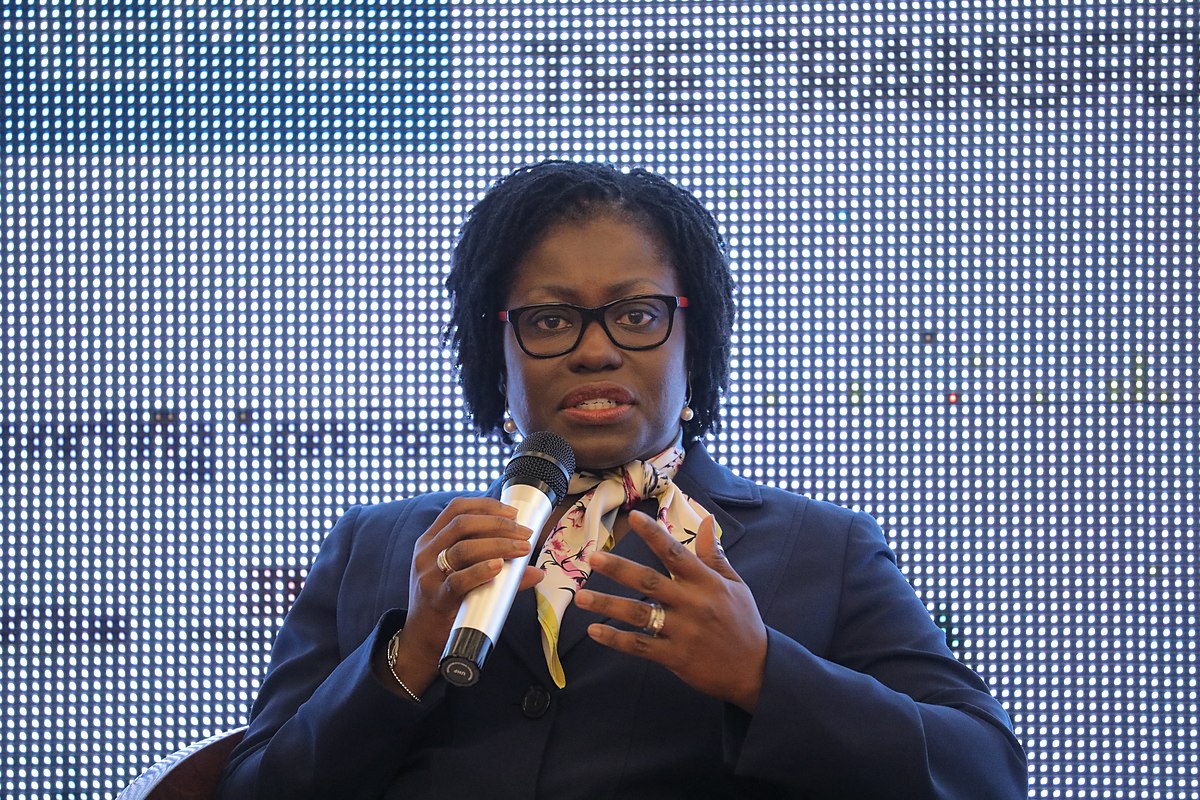Let’s support women enterpreneurs to contribute to national development- Elsie Awadzi
Second Deputy Governor at the Bank of Ghana, Elsie Addo Awadzi has urged members of Association of Ghana Industries (AGI) and stakeholders in the sector to support women entrepreneurs to enable them to contribute their quota to national development.
She argued that entrepreneurship comes naturally to women and perhaps, second nature among women though they are often the unsung heroes in national discourse.
Speaking at the second Anniversary celebration of the Association of Ghana Industries’ (AGI) Women in Business Initiative dubbed “Women-Led Businesses: Exploring Finance Channels and Market Access for Growth, Mrs Awadzi said many women in formal employment also tend to get involved in other small businesses to help supplement the household income and to improve the financial standing of the family.
According to the World Bank, forty-four percent of micro, small, and medium enterprises (MSMEs) in Ghana are female-owned, and this sector accounts for about 92 percent of all businesses and contributes about 70 percent of Ghana’s GDP.
More recent data shows that Ghana’s private sector is dominated by women entrepreneurs, second only to Uganda, according to the 2019 MasterCard Index of Women Entrepreneurs.
However, women entrepreneurs and businesses owned are facing serious challenges because data suggests that these businesses tend to remain smaller and less profitable than those owned by men, owing in part to limited access to business support services, markets, and finance.
Also, Goldman Sachs estimates that 70 percent of women-owned formal SMEs are unserved or underserved in terms of access to credit, amounting to a US$285 billion credit gap, and closing this credit gap in developing countries could lead to a 12 percent increase in per-capita GDP by 2030.
According to an African Development Bank report on Affirmative Finance 3 Action for Women in Africa, there is an estimated US$42 billion financing gap for African women entrepreneurs across business value chains, and only 16-20 percent of women in Sub-Saharan Africa are able to access long-term financing from formal financial institutions.
According to her, female entrepreneurs are eight percent times less likely than men to access the kind of capital and other financial services and products that they need to start or scale up their businesses, according to the World Bank’s 2017 Global Findex Survey.
She noted how the shock from the COVID-19 pandemic has impacted negatively on women-owned and women-led businesses disproportionately because many female entrepreneurs operate in the informal sector or in the MSME sector.
“For some of these, their businesses remain closed or struggle to regain lost markets and opportunities”, she said.
She again said, limited market access and limited access to finance remain some of the key challenges for all stages of businesses owned by women in Ghana, but added that, there is good news which are the growing opportunities to address these bottlenecks that limit women-owned and women-led businesses.
She further explained that the Market access for Ghanaian businesses continues to expand although the participation of female entrepreneurs in some of Ghana’s fast-growing economic sectors such as technology remains marginal.
“Beyond Ghana, there is great potential for women to harness the benefits of the AfCFTA which creates a single Africa market, as well as many other opportunities beyond Africa, thanks to technology and e-commerce platforms among others”,
“These market opportunities offer hope to women-owned and women-led businesses in Ghana to scale up and to compete with their peers abroad”, she noted.
Mrs. Awadzi continued that in addressing the limited access to finance challenge, a lot is required both on the side of female entrepreneurs, their businesses on one hand and financial institutions on the other.
According to her, female entrepreneurs must understand various financing options such as bank financing, and financing by specialised deposit-taking institutions (SDIs) such as savings and loans companies, finance houses, micro finance companies and rural and community banks who tend to focus on MSMEs.
She stressed that Bank of Ghana has put in place mechanisms to support the delivery of credit on a sustainable basis to businesses including women-owned MSMEs like the credit bureau-based reporting system that ensures that banks and other licensed lenders report on credit behaviour (prompt loan repayments as well as defaults) on all borrowers, and that creditors check on borrowers’ credit behaviour before they make credit decisions on loan applications.
“Responsible borrowers therefore stand a better chance to access more loans and at reasonable interest rates as their credit risk will be lower”, she said.
Also, she noted, the Bank of Ghana’s Collateral Registry registers all collateral (over movable and immovable assets) provided by borrowers to licensed creditors and facilitates the delivery of credit to borrowers (especially women) who might not have access to immovable asset collateral.
While banks and SDIs continue to expand their client base and lend to more businesses, including women-owned and women-led businesses, she said, it is important to stress that bank and SDI financing which is loan-based which is not the only type of funding available for businesses and indeed may not always be ideal for a business depending on its stage and its needs.
“Sometimes, longer-term and more patient forms of capital may be more appropriate for a business in lieu of or in addition to bank or SDI loans. Such alternative sources of funding include venture capital and private equity financing, equity and bond financing from the stock market (which includes the Ghana Stock Exchange’s Alternative Market and Ghana Fixed Income Market), finance leasing and hire purchase, all of which are available in Ghana today”, she noted.
She urged women-owned entrepreneurs to fully understand the options and requirements available for accessibility, including good governance, good financial management, and compliance with regulatory and technical standards, among others because finding and accessing the right financing at the right time is critical for business survival and growth.
Furthermore, she added that, women entrepreneurs and business leaders must overcome the risk aversion for seeking financing from the financial market, and confidently take advantage of opportunities that exist to tap into appropriate sources of financing for their businesses.
“For example, it turns out that while women entrepreneurs tend to be more prudent and responsible borrowers and actually tend to pay back their loans on time, they are often afraid to borrow the amounts of money their businesses need even when they can afford to pay back”, she added.
Mrs. Awadzi again argued that, when women do not ask enough for financial support and do not receive what their businesses need, it hampers the growth and survival of their businesses.
On the part of banks, SDIs and other financial services providers, she advised that there is the need to understand the women market to specifically tailor products that work for them, adding that, women entrepreneurs form a significant and viable unique market needs to be understood and serviced to the benefit of the country.
“Given the critical role of women-owned and women-led businesses in our socio-economic development, our entire nation stands to gain significantly by equipping these businesses to scale up with good business practices, technology and technical support, and access to finance”, she noted.
She again expressed hope that in supporting women-owned and women-led businesses, the country would be positioning the economy to grow on a sustainable basis.
In addition to access to finance, she indicated that programmes that provide networking, mentoring and coaching opportunities for women are needed to provided them with world-class business and entrepreneurial skills, which will go a long way to help access the Africa market and build competitive and sustainable businesses.
This, she said therefore requires broad stakeholder cooperation to develop interventions that support women-owned and women-led businesses, stating that, empowering women should not be a charitable cause that one occasionally looks at to do some good but should be at the heart of corporate strategies and macroeconomic policy.
Mrs. Awadzi stressed that Bank of Ghana would continue to do its best within its statutory mandate to promote price stability and financial stability which are key ingredients for the development of strong viable business.
“Thanks to necessary and difficult reforms undertaken by the Bank of Ghana before the COVID-19 pandemic, policy and regulatory reliefs announced at the onset of the pandemic, the banking sector in Ghana has played a critical role in helping to mute the effects of the pandemic on our real sector”, she said.
Among other things, she claimed, banks, savings and loans companies, finance houses, microfinance companies, and rural and community banks were able to restructure loans and suspend loan repayments for customers who were negatively impacted by the pandemic.
She continued that the Central Bank expects banks and SDIs to continue in their efforts to support a strong recovery of the Ghanaian economy through reasonably-priced credit delivered in a prudent manner, indicating that, Banks must promote gender equity in their lending and other operations and help support the transition to a greener economy, guided by the Sustainable Banking Principles launched in November 2019 by the Bank of Ghana, Ghana Association of Bankers, and Environmental Protection Agency.
“We expect banks to deploy technology and strategic partnerships to promote access to finance for all segments of our economy, including women-owned businesses, through innovative products, services, and delivery channels”, she noted.
She further advised Women-owned and women-led businesses to embrace digital financial services provided by banks to help formalise payments for their goods and services so as to help them build the relevant banking history needed to access critical financing for their businesses.
According to her, BoG remains committed to promote policies and regulatory environment that supports inclusive and broad-based economic growth where all economic actors including women entrepreneurs, are able to innovate and access appropriate forms of financing and at cost-effective rates to help launch, grow, and sustain their businesses.
“Congratulations to the AGI-Women in Business initiative. On your second anniversary, you are only just starting and your work is cut out for you in the area of advocacy, providing dialogue opportunities for awareness creation for all stakeholders, and supporting your members to step up to opportunities available as you help to promote more opportunities for women-owned and women-led businesses”, she added
Source: africaneditors.com/
Eric Nii Sackey



There is a good reason why you should support the African Editors. Not everyone can afford to pay for news right now. That is why we keep our journalism open for everyone to read, including in Ghana. If this is you, please continue to read for free. But if you are able to, then there are three good reasons to support us today.
1. Our quality, journalism is a scrutinising force at a time when the rich and powerful are getting away with more and more.
2. We are independent and have no billionaire owner pulling the strings, so your money directly powers our reporting.
3. It doesn’t cost much, and takes less time than it took to read this message.
Help power the African Editors' journalism for the years to come, whether with a small sum or a larger one. If you can, please support us on a monthly basis from just 1 Ghana Cedi through mobile money number: 0599896099/ +23359989609 and you can be rest assured that you’re making a big impact every single month in support of open, independent journalism. Thank you.
Related



















































